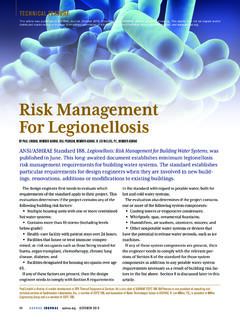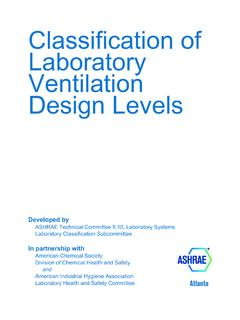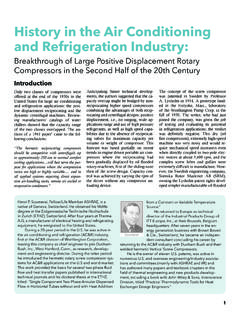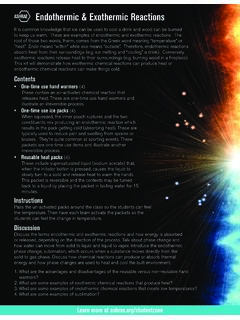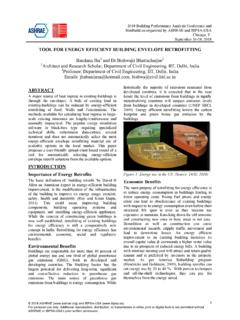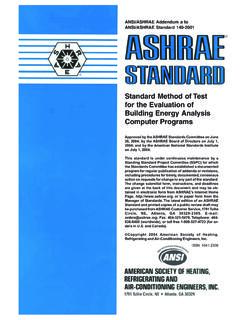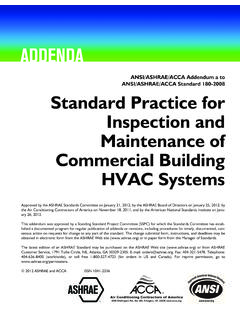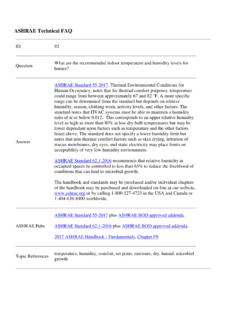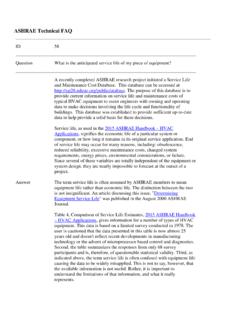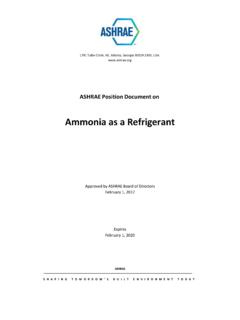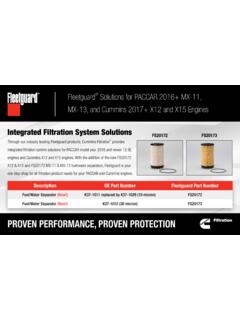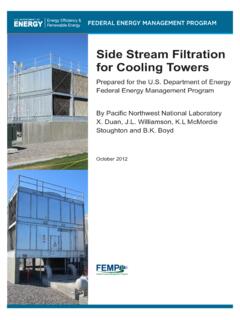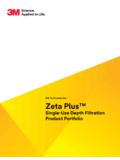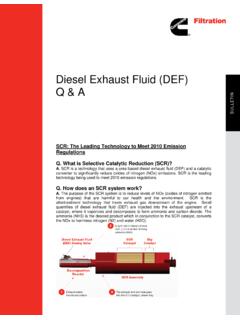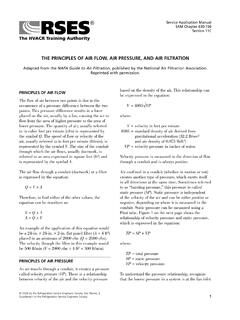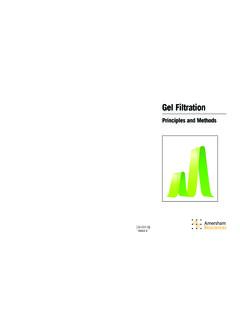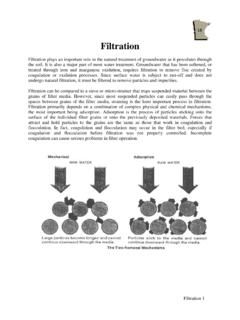Transcription of Q2: How often should HVAC filters be changed? - ASHRAE
1 Q1. What filters are recommended for HVAC systems? A: Our current recommendation is to use a filter with a Minimum Efficiency Reporting Value (MERV) of 13, but a MERV 14 (or better) filter Is preferred. Of course, the ultimate choice needs to take the capabilities of the HVAC systems into consideration. Generally, increasing filter efficiency leads to increased pressure drop which can lead to reduced air flow through the HVAC system , more energy use for the fan to compensate for the increased resistance, or both. If a MERV 13 filter cannot be accommodated in the system , then use the highest MERV rating you can. Appropriate filters tested under the ISO 16890 Standard can also be used.
2 The table below provides approximate relationships between ratings under the ASHRAE MERV and ISO 16890 test methods. The current recommendations would suggest using a filter with an ePM1 rating under ISO 16890. *MERV-A will give closer results between the two standards. Charged media filters usually show a drop-off in efficiency with use. ISO 16890 captures this with an IPA condition step. ASHRAE can capture this drop if the test is done with the optional Appendix J which gives the MERV-A. Thus the MERV and the ePM ratings do not reflect the same testing. For charged media, the MERV will likely make the filter appear more efficient than the ePM rating.
3 Q2: How often should HVAC filters be changed? A: Please refer to current ASHRAE guidance on HVAC system Maintenance and Filter Replacement during the COVID-19 Pandemic. filters in HVAC systems should be changed according to the typical schedule or even left in place longer than normal. Extending the time between filter changes is a strategy being employed during the current COVID-19 pandemic. If lower rated filters were upgraded to meet ASHRAE recommendations of at least a MERV 13 filter, there was likely an increase in airflow resistance (increased pressure drop) when the new filters were installed. However, the upgraded filters may be capable of holding more dust than the lower rated filters without a substantial additional increase in air flow resistance.
4 Thus, extending the time between filter changes may be beneficial. Either way, the risks from not changing filters right on time are small. The filters may load more than normal, which could lead to slight reductions in air flow. The secondary impact of that depends on the type of building and building occupancy (among others). Q3: What is the size of the SARS-CoV-2 virus, and can it be captured by ventilation filters ? A: Research has shown that the particle size of the SARS-CoV-2 virus is around m (micrometer). However, the virus does not travel through the air by itself. Since it is human generated, the virus is trapped in respiratory droplets and droplet nuclei (dried respiratory droplets) that are predominantly 1 m in size and larger.
5 ASHRAE currently recommends using a minimum MERV 13 filter, which is at least 85% efficient at capturing particles in 1 m to 3 m size range. A MERV 14 filter is at least 90% efficient at capturing those same particles. Thus, the recommended filters are significantly more efficient at capturing the particles of concern that a typical MERV 8 filter which is only around 20% efficient in the 1 m to 3 m size range. filters with MERV ratings higher than 14 would capture an even higher percentage of the particles of concern. High-efficiency particulate air (HEPA) filters are even more efficient at filtering human-generated infectious aerosols.
6 By definition, a HEPA filter must be at least efficient at capturing particles m in size. This m particle approximates the most penetrating particle size (MPPS) through the filter. HEPA filters are even more efficient at capturing particles larger AND smaller than the MPPS. Thus, HEPA filters are more that efficient at capturing airborne viral particles associated with SARS-CoV-2. Q4: should HVAC system maintenance, including filter changes, be postponed during the pandemic? A: Please refer to current ASHRAE guidance on HVAC system Maintenance and Filter Replacement during the COVID-19 Pandemic. It is not necessary to suspend HVAC system maintenance and/or filter changes during the COVID-19 pandemic, but some additional safety precautions are warranted.
7 At this time little is known about the penetration of SARS-CoV-2 into HVAC systems. The task force is developing a research work statement to study just that. Neither ASHRAE nor CDC has posted guidance on the decontamination of HVAC systems (to include air filtration systems) potentially exposed to SARS-CoV2. The survival time of SARS-CoV-2 in air has been estimated at several hours and survival on surfaces is, at most, several days. There is no evidence to date that SARS-CoV-2 penetrates to a significant extent through central air-handling units to cause risk in spaces where infectors are not present. should HVAC systems actually become contaminated with viable virus, the most likely scenario for disinfection is that the virus would lose its viability naturally within hours-to-days, and thus, there is no guidance advocating proactive system shutdown for decontamination and/or filter replacement.
8 There are no published laboratory studies showing whether the SARS-CoV-2 virus can be re-aerosolized from ventilation air filters or other HVAC surfaces. Laboratory studies indicate that re-aerosolization of viable mycobacteria, which are of similar size to viral particles, from filter material is not probable under normal conditions. However, the risks associated with handling filters or performing other maintenance activities inside HVAC systems potentially contaminated with coronaviruses under field-use conditions have not been evaluated. Therefore, it is recommended that workers performing maintenance and replacing filters on any ventilation system with the potential for viral contamination wear a properly fitted respirator (N95 or higher), eye protection, and gloves.
9 The HVAC systems should be turned off prior to entry for any maintenance activity. When feasible, filters can be disinfected by spraying them with a 10% bleach solution or another appropriate disinfectant, approved for use against human coronaviruses (see EPA List N), before removal and disposal. Disinfectants should not be used on ventilation filters prior to continued use of the filters inside ventilation systems. The effects of the disinfectants on filter performance are unknown. filters should only be sprayed with disinfectants if they are to be removed from service and discarded. Whether disinfected or not, filters removed from HVAC systems with suspected coronavirus contamination can be placed into a regular trash bag (do not bend, tear or crush the filters ) and disposed of as normal trash.
10 There are no special bagging/tagging requirements or waste processing steps necessary, outside of the normal waste processing procedures. When maintenance tasks are completed, maintenance personnel should immediately wash their hands with soap and water or use an alcohol-based hand sanitizer. Q5: Are there recommended procedures for disinfecting HVAC equipment? A: Neither ASHRAE nor CDC has posted guidance on the decontamination of HVAC systems (to include air filtration systems) potentially exposed to SARS-CoV2. To date, there has not been compelling evidence to demonstrate that viable virus is contaminating these systems. should such systems actually become contaminated with viable virus, the most likely scenario is believed to be that the virus would lose its viability naturally within hours-to-days, and thus, there is no guidance advocating proactive system shutdown for decontamination and/or filter exchange.
